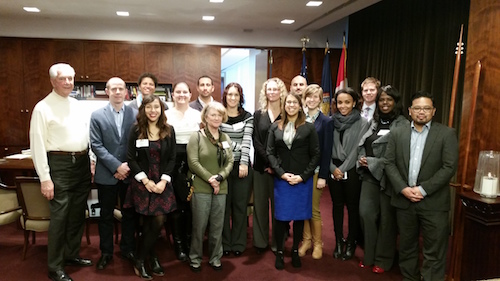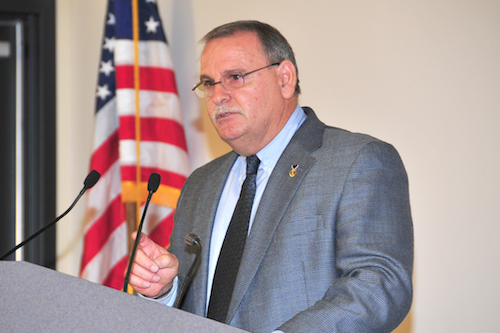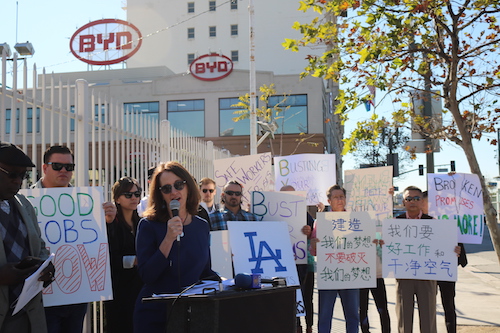Marvin Kropke emphasizes that fighting back against difficult manufacturing trends isn’t easy, especially when it comes to keeping jobs in the United States.
But the Los Angeles Local 11 business manager and his members combined with Jobs to Move America to do just that when local officials selected a Japanese company to work on a large mass transportation project.
“This is about the business model of manufacturing in this country,” Kropke said. “It’s about whether they can build this here and whether we can organize and have those middle class jobs brought back to our community.”

|
| Then-President Edwin D. Hall (far left) and International Representative Jerry Kurimski (back row, far right) during a Jobs to Move America coalition meeting at IBEW headquarters in Washington in December 2014.
|
Kinkisharyo International – the U.S. subsidiary of the Kinki Sharyo Corp., of Osaka, Japan – entered into an $890 million contract with the Los Angeles County Metropolitan Transportation Authority in 2014 to build about 175 light-rail cars. It agreed to do much of the work in nearby Palmdale, Calif., where Kinkisharyo planned to retrofit an existing manufacturing plant that would employ up to 250 workers.
Employees at the Palmdale plant, who now are working out of a temporary facility, voted via card-check later in 2014 for Local 11 to represent them. Contract negotiations are ongoing.
IBEW officials hope to spur these kind of results nationally because of its partnership with Jobs to Move America, whose mission is to use the more than $5 billion spent on rail cars and busses annually in the United States to create and maintain more good-paying jobs.
Most of the companies involved in such work are based overseas, so it’s not an easy sell. But the IBEW and JMA argue they’re the beneficiaries of public tax dollars that fund such projects.
“Without our involvement, without JMA’s involvement, those jobs would not be here,” Kropke said. “Kinkisharyo would love to have those jobs in Japan.”
Jobs to Move America was founded in 2012 and is a coalition of about 30 labor, academic, civil rights and environmental groups, including the IBEW.
In December 2014, it released a report on Capitol Hill in conjunction with the University of Massachusetts’ Political Economy Economic Research Institute, detailing ways to better monitor Buy American provisions in the long-term transportation bill recently signed by President Obama.
In addition to Los Angeles, the IBEW and JMA are working together in Chicago, Boston and Rochelle, Ill., where projects to upgrade public transportation are underway, International Representative for Membership Development Jerry Kurimski said.

|
| Marvin Kropke, business manager of Los Angeles Local 11.
|
The goal is the same as in southern California: Use dollars spent on those projects to create good-paying opportunities in those communities.
“You’re putting emphasis on training, upward mobility and quality benefits,” Kurimski said. “It does that through policy initiatives and transit authorities, where we get in there and have a working relationship with leaders in those industries.”
Kropke has worked closely for many years with Jobs to Move America Director Madeline Janis, who was the executive director of the Los Angeles Alliance for a New Economy from 1993-2012. LAANE, as it is called in southern California, has worked to improve the environment and working conditions in and around the city.
Those long-standing ties have formed relationships in the Los Angeles political and business community.
“The IBEW has been one of our core partners from the very beginning,” Janis said. “Marvin Kropke and Local 11 have always been leaders at creating good manufacturing jobs.”
Added Kropke: “A format like JMA needs strong union support. It does a lot of good things, but you have to have the vigor and enthusiasm that only unions can bring.”
What started in southern California is something coalition organizers hope can be duplicated in other cities.
With assistance from the IBEW and Jobs to Move America, the Chicago Federation of Labor entered into a “Build Chicago” agreement with the city’s transit agency in July 2014. The Chicago Transit Authority is asking bidders for work on a $2 billion upgrade of the city’s light-rail system for the number and type of new jobs their company will provide if awarded the contract.
“By including incentives for U.S. job creation and workforce development in its procurement, CTA is using its purchasing power for community benefit,” then-IBEW President Edwin D. Hill said when the agreement was announced. “IBEW applauds Mayor (Rahm) Emanuel for using the power of this $2 billion purse to spur job creation and opportunities for working families.”
The task is a little more formidable in areas without those deep ties, but not impossible.
Sixth District Region Organizing Coordinator Lynn Arwood said Jobs to Move America has been a huge asset in ongoing attempts to organize the Nippon Sharyo-owned plant in Rochelle, which opened in 2012.
Nippon Sharyo, based in Nagoya, Japan, has refused to meet with officials from the IBEW and other trade unions, even though the company accepted $4.7 million in incentives from Illinois officials to build the factory, which produces light rail cars. Arwood says it’s been a tough fight, but momentum has changed since Jobs to Move America began assisting her and other local organizers in 2014.

|
| Jobs to Move America director Madeline Janus speaks at a recent protest in Los Angeles.
|
“The support they have given on the ground, I’m very grateful for,” Arwood said.
Jennifer Svenkerud, a Nippon Sharyo worker who was fired after filing a complaint with the Occupational Safety and Health Administration over unsafe working conditions, has met with Labor Secretary Thomas Perez.
Arwood said those inroads probably don’t happen without Jobs to Move America.
“They have the connections to get the story out that needs to be heard,” Arwood said. “I believe it’s because of them we’ve been able to get to key people and tell them our stories.”
Arwood noted that Janis, who is an attorney, agreed to represent Svenkerud on a pro bono basis.
“Jobs to Move America is the kind of coalition we’ve dreamed about having from Day One,” she said.
There have been some hiccups along the way, including in Los Angeles. In the fall of 2014, Kinkisharyo threatened to scrap the production facility and build in another state over an organizing dispute.
Los Angeles Mayor Eric Garcetti encouraged both parties to return to the table and helped broker a new agreement and Kinkisharyo agreed not to contest its employees’ decision to allow Local 11 to serve as their bargaining agent. Kropke said he’s pleased that Local 11 earned the right to represent those working people, but he’s not satisfied. Local 11’s bargaining team is pushing to raise workers’ salaries, he said.
Kurimski said there’s been progress, noting the Los Angeles negotiations and the “Build Chicago” accord. Getting those deals in contract form is a step forward, he said. He hopes the relationship the IBEW has with Jobs to Move America can be copied in other areas beside public transportation.
“I’m happy and I hope it’s just the beginning,” he said. “I think we can use this as an example and take this as a model and blueprint for other industries.”